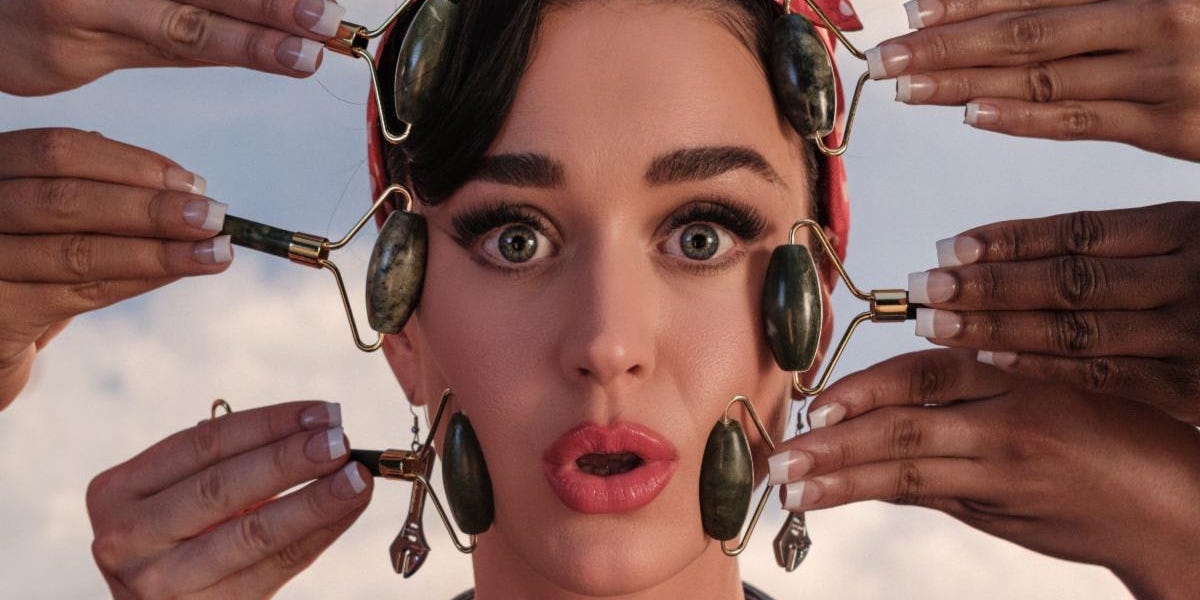This week, Katy Perry teased the announcement of her new album, “143,” with an ominous promise: “Sleep tight, for tomorrow, the portal opens.”
Listening to the album’s lead single, “Woman’s World,” I have to assume it’s a portal to the past.
“Woman’s World,” released on Thursday, can only be read as a desperate attempt to recapture the magic of Perry’s pop domination in the 2010s — those bygone days when girlboss mentality reigned, and it was considered radical to say women could do everything men could do, and we do it in heels!
In the music video for “Woman’s World,” Perry’s visuals are clearly meant to be tongue-in-cheek. She casts herself as a hyper-sexualized version of Rosie the Riveter, traipsing around in a star-spangled bikini before an anvil crushes her.
Later, she’s revived as a sexy half-cyborg, brandishing an influencer’s ring light as a Venus symbol and driving a monster truck with a bedazzled uterus hanging from its bumper.
Perry’s indiscreet attempts at satire clash with the song’s actual lyrics. Satire only works when it has something to say, and there isn’t a shred of complexity, self-awareness, or cultural analysis in lyrics like, “She’s a flower, she’s a thorn / Superhuman, No. 1 / She’s a sister, she’s a mother.”
The Venus symbol and the bedazzled uterus don’t read as subversive in this context; they align perfectly with Perry’s gender-essentialist imagery. The entire song exists in this way: platitudinal and pandering with no material goal, even more vapid than the initial teasers foreshadowed.
It’s been four years since Perry closed her previous album, “Smile,” with a near-identical sentiment: “Is it the way we keep / The whole world turning / In a pair of heels? / Yeah, that’s what makes a woman.”
So much has evolved since then, but apparently, not for Perry. Somehow, she still thinks that reciting a list of random adjectives and haphazardly conflating stilettos with strength is the epitome of feminism.
Perry chose Dr. Luke and his team to craft this supposed feminist anthem
Actually, one thing is different. Five people are credited as songwriters for “What Makes a Woman,” but none overlap with the six writers credited for “Woman’s World.” It took six people to come up with rhyming “feminine divine” with “born to shine” — and as you may have heard, one of them is Dr. Luke.
Perry has worked with Dr. Luke many times before. He was instrumental in the chart-topping success of Perry’s “Teenage Dream” and “Prism” eras. However, until now, Perry hadn’t worked with Dr. Luke since 2014, when he was sued by Kesha for emotional and sexual abuse.
Kesha’s civil complaint details a decade of life-threatening eating disorders and psychological torture at the hands of Dr. Luke, the man who discovered her as a teenager. It includes the allegation that he drugged and raped her. Dr. Luke has denied everything.
James Devaney/GC Images
Dr. Luke was never convicted in a court of law. His lawyers fought Kesha’s civil suit on technical grounds, and it was dismissed in 2018 because the statute of limitations had expired, not because her claims were deemed meritless.
Similarly, when Dr. Luke countersued Kesha for defamation, the case never reached a jury. Instead, the parties reached an undisclosed settlement last year.
Just one year after Dr. Luke’s legal battle ended, he’s already been welcomed back into Perry’s orbit.
To be sure, Perry is not the only artist who’s worked with the disgraced pop producer since Kesha’s allegations shook the industry. His name (and his various pseudonyms, including Tyson Trax and Loctor Duke) can be found scattered across the credits on Doja Cat’s Grammy-nominated album “Planet Her,” Nicki Minaj’s “Pink Friday 2,” and Kim Petras’ entire catalog.
Indeed, Dr. Luke has quietly mounted a comeback in recent years, earning Grammy nominations for his work on quintessential Doja tracks like “Say So” and “Best Friend,” as well as a win for “Kiss Me More.” Although Doja distanced herself from Dr. Luke in 2021 (his name is absent from her latest album, “Scarlet”), others are still keen to work with an established hitmaker, whatever his reputation.
So no, Perry isn’t alone, but the hypocrisy at work here is stunning. To enlist an accused abuser for a song about female empowerment — a song that’s literally called “Woman’s World” — is ironic in a way that’s almost too glaring to fathom. It might be funny if it weren’t so gross.
Capitol Records
Wouldn’t it make more sense for Perry to work with female songwriters and producers to bring her feminine vision to life? Or, at the very least, a man with a track record for making women feel comfortable in the studio? There are plenty to choose from: Jack Antonoff and SG Lewis come to mind, or perhaps Zedd, who produced “Never Really Over,” Perry’s greatest triumph of the past decade.
Perry made a different, very deliberate choice. She wanted Dr. Luke and all the baggage he brings; all four other songwriters on “Woman’s World” are Dr. Luke collaborators or signees.
“Katy knew exactly the album she wanted to make and put together the team to make it happen,” a Capitol Records source told Rolling Stone.
Perry’s ‘Woman’s World’ proves she’s stuck in a sound of the past
Surely Perry knew she’d face backlash — and for what? “Woman’s World” is not a good song, not by any measure. It has all the warmth and charisma of an AI chatbot, all the bomb-like subtlety of a “Saturday Night Live” parody. In fact, the heavy-handed self-ridicule in “This Is Not a Feminist Song” is more inclusive and nuanced than Perry’s latest work — and that skit aired in 2016, back when Hillary Clinton thought she would be the first female president.
Eight years later, Perry is cosplaying a version of herself on that very campaign trail, a dewy-eyed heroine who no longer exists.
Slinking back to Dr. Luke to produce a song like this, so insipid and uninspired, is the mark of an artist who’s not only stuck in the past but unable to see the challenges beyond her narrow periphery.
Perhaps in Perry’s white, cisgender, mega-wealthy household, it really does feel like a woman’s world. For the rest of us living in reality, it is very much not — and the shallow idealism of the 2010s, the very fuel of Perry’s once-beloved empowerment porn (“Firework,” “California Gurls,” “Roar”) plays as tone-deaf and patronizing today.
Whatever kind of delusional utopia Perry is trying to sell, I’m not buying it. But on the bright side, she could make good money licensing this song for a Tampax commercial.
![]()





